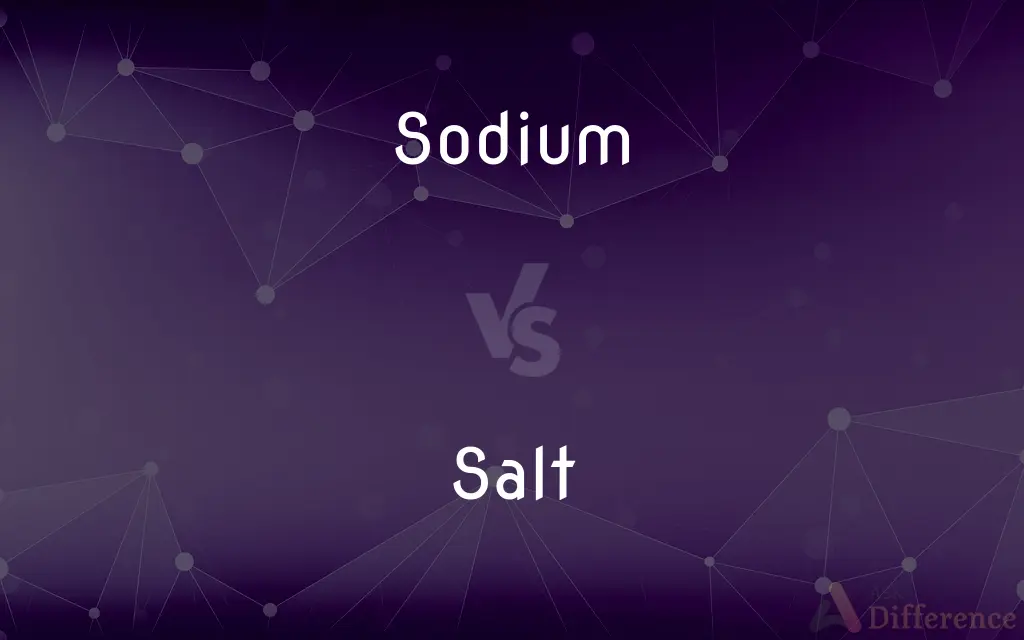Sodium vs. Salt — What's the Difference?

Difference Between Sodium and Salt
ADVERTISEMENT
Compare with Definitions
Sodium
Sodium is a chemical element with the symbol Na (from Latin natrium) and atomic number 11. It is a soft, silvery-white, highly reactive metal.
Salt
Salt is a mineral composed primarily of sodium chloride (NaCl), a chemical compound belonging to the larger class of salts; salt in the form of a natural crystalline mineral is known as rock salt or halite. Salt is present in vast quantities in seawater.
Sodium
The chemical element of atomic number 11, a soft silver-white reactive metal of the alkali metal group.
Salt
A usually whitish crystalline solid, chiefly sodium chloride, used extensively in ground or granulated form as a food seasoning and preservative. Also called common salt, table salt.
Sodium
A soft, light, extremely malleable silver-white element that is an alkali metal, reacts violently with water, is naturally abundant in combined forms, especially in common salt, and is used in the production of a wide variety of industrially important compounds. Sodium ions are essential to numerous biological processes in animals. Atomic number 11; atomic weight 22.9898; melting point 97.80°C; boiling point 883°C; specific gravity 0.971 (20°C); valence 1. See Periodic Table.
ADVERTISEMENT
Salt
An ionic chemical compound formed by replacing all or part of the hydrogen ions of an acid with metal ions or other cations.
Sodium
The chemical element (symbol Na) with an atomic number of 11 and atomic weight of 22.990. It is a soft, waxy, silvery, reactive alkali metal that is never found unbound in nature.
Salt
Salts Any of various mineral salts used as laxatives or cathartics.
Sodium
Employing sodium.
Salt
Salts Smelling salts.
Sodium
A common metallic element of the alkali group, in nature always occuring combined, as in common salt, in albite, etc. It is isolated as a soft, waxy, white, unstable metal, so highly reactive that it combines violently with water, and to be preserved must be kept under petroleum or some similar liquid. Sodium is used combined in many salts, in the free state as a reducer, and as a means of obtaining other metals (as magnesium and aluminium) is an important commercial product. Symbol Na (Natrium). Atomic weight 22.990. Specific gravity 0.97.
Salt
Often salts Epsom salts.
Sodium
A silvery soft waxy metallic element of the alkali metal group; occurs abundantly in natural compounds (especially in salt water); burns with a yellow flame and reacts violently in water; occurs in sea water and in the mineral halite (rock salt)
Salt
An element that gives flavor or zest.
Salt
Sharp lively wit.
Salt
(Informal) A sailor, especially when old or experienced.
Salt
A saltcellar.
Salt
Containing or filled with salt
A salt spray.
Salt tears.
Salt
Having a salty taste or smell
Breathed the salt air.
Salt
Preserved in salt or a salt solution
Salt mackerel.
Salt
Flooded with seawater.
Salt
Found in or near such a flooded area
Salt grasses.
Salt
To add, treat, season, or sprinkle with salt.
Salt
To cure or preserve by treating with salt or a salt solution.
Salt
To provide salt for (deer or cattle).
Salt
To add zest or liveliness to
Salt a lecture with anecdotes.
Salt
To give an appearance of value to by fraudulent means, especially to place valuable minerals in (a mine) for the purpose of deceiving.
Salt
A common substance, chemically consisting mainly of sodium chloride (NaCl), used extensively as a condiment and preservative.
Salt
(chemistry) One of the compounds formed from the reaction of an acid with a base, where a positive ion replaces a hydrogen of the acid.
Salt
(uncommon) A salt marsh, a saline marsh at the shore of a sea.
Salt
(slang) A sailor also old salt.
Salt
(cryptography) Randomly chosen bytes added to a plaintext message prior to encrypting or hashing it, in order to render brute-force decryption more difficult.
Salt
A person who seeks employment at a company in order to (once employed by it) help unionize it.
Salt
(obsolete) Flavour; taste; seasoning.
Salt
(obsolete) Piquancy; wit; sense.
Attic salt
Salt
(obsolete) A dish for salt at table; a salt cellar.
Salt
Epsom salts or other salt used as a medicine.
Salt
(figurative) Skepticism and common sense.
Any politician's statements must be taken with a grain of salt, but his need to be taken with a whole shaker of salt.
Salt
(Internet slang) Tears; indignation; outrage; arguing.
There was so much salt in that thread about the poor casting decision.
Salt
The money demanded by Eton schoolboys during the montem.
Salt
One who joins a workplace for the purpose of unionizing it.
Salt
A bounding; a leaping; a prance.
Salt
Salty; salted.
Salt beef;
Salt tears
Salt
Saline.
A salt marsh;
Salt grass
Salt
Related to salt deposits, excavation, processing or use.
A salt mine
The salt factory is a key connecting element in the seawater infrastructure.
Salt
Bitter; sharp; pungent.
Salt
Salacious; lecherous; lustful; (of animals) in heat.
Salt
Costly; expensive.
Salt
(transitive) To add salt to.
To salt fish, beef, or pork; to salt the city streets in the winter
Salt
(intransitive) To deposit salt as a saline solution.
The brine begins to salt.
Salt
To fill with salt between the timbers and planks for the preservation of the timber.
Salt
To insert or inject something into an object to give it properties it would not naturally have.
Salt
(mining) To blast metal into as a portion of a mine in order to cause to appear to be a productive seam.
Salt
(archaeology) To add bogus evidence to an archaeological site.
Salt
(transitive) To add certain chemical elements to (a nuclear weapon) so that it generates more radiation.
Salt
(transitive) To sprinkle throughout.
They salted the document with arcane language.
Salt
(cryptography) To add filler bytes before encrypting, in order to make brute-force decryption more resource-intensive.
Salt
To render a thing useless.
Salt
To sow with salt (of land), symbolizing a curse on its re-inhabitation.
In this place were put to the ground and salted the houses of José Mascarenhas.
Salt
(wiki) To lock a page title so it cannot be created.
Salt
The chloride of sodium, a substance used for seasoning food, for the preservation of meat, etc. It is found native in the earth, and is also produced, by evaporation and crystallization, from sea water and other water impregnated with saline particles.
Salt
Hence, flavor; taste; savor; smack; seasoning.
Though we are justices and doctors and churchmen . . . we have some salt of our youth in us.
Salt
Hence, also, piquancy; wit; sense; as, Attic salt.
Salt
A dish for salt at table; a saltcellar.
I out and bought some things; among others, a dozen of silver salts.
Salt
A sailor; - usually qualified by old.
Around the door are generally to be seen, laughing and gossiping, clusters of old salts.
Salt
The neutral compound formed by the union of an acid and a base; thus, sulphuric acid and iron form the salt sulphate of iron or green vitriol.
Salt
Fig.: That which preserves from corruption or error; that which purifies; a corrective; an antiseptic; also, an allowance or deduction; as, his statements must be taken with a grain of salt.
Ye are the salt of the earth.
Salt
Any mineral salt used as an aperient or cathartic, especially Epsom salts, Rochelle salt, or Glauber's salt.
Salt
Marshes flooded by the tide.
His fashion is not to take knowledge of him that is beneath him in clothes. He never drinks below the salt.
Salt
The act of leaping or jumping; a leap.
Salt
Of or relating to salt; abounding in, or containing, salt; prepared or preserved with, or tasting of, salt; salted; as, salt beef; salt water.
Salt
Overflowed with, or growing in, salt water; as, a salt marsh; salt grass.
Salt
Fig.: Bitter; sharp; pungent.
I have a salt and sorry rheum offends me.
Salt
Fig.: Salacious; lecherous; lustful.
Mine eyes are full of tears, I can not see;And yet salt water blinds them not so muchBut they can see a sort of traitors here.
Salt
To sprinkle, impregnate, or season with salt; to preserve with salt or in brine; to supply with salt; as, to salt fish, beef, or pork; to salt cattle.
Salt
To fill with salt between the timbers and planks, as a ship, for the preservation of the timber.
Salt
To deposit salt as a saline solution; as, the brine begins to salt.
Salt
A compound formed by replacing hydrogen in an acid by a metal (or a radical that acts like a metal)
Salt
White crystalline form of especially sodium chloride used to season and preserve food
Salt
Negotiations between the United States and the Union of Soviet Socialist Republics opened in 1969 in Helsinki designed to limit both countries' stock of nuclear weapons
Salt
The taste experience when salt is taken into the mouth
Salt
Add salt to
Salt
Sprinkle as if with salt;
The rebels had salted the fields with mines and traps
Salt
Add zest or liveliness to;
She salts her lectures with jokes
Salt
Preserve with salt;
People used to salt meats on ships
Salt
Containing or filled with salt;
Salt water
Salt
Of speech that is painful or bitter;
Salt scorn
A salt apology
Salt
One of the four basic taste sensations; like the taste of sea water
Share Your Discovery

Previous Comparison
Outset vs. Inset
Next Comparison
Butter vs. Stork













































